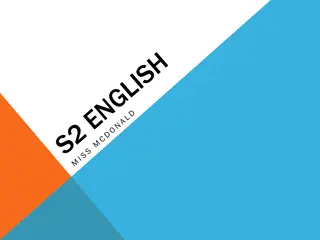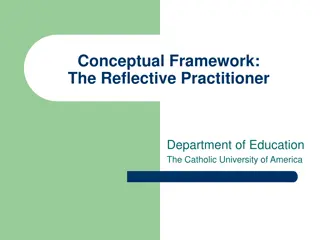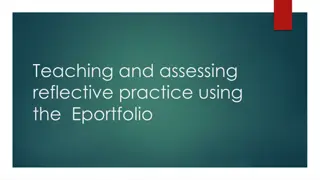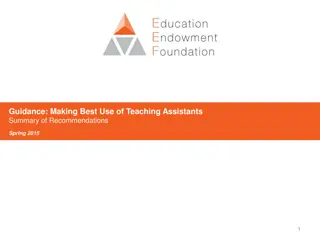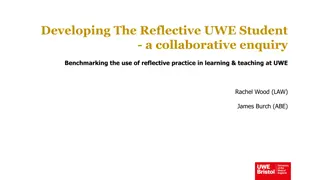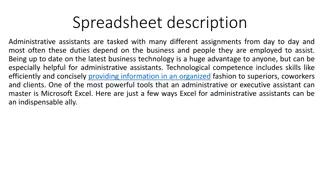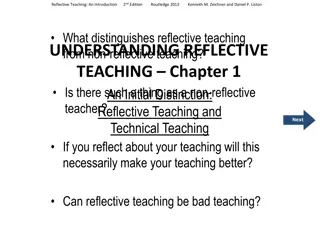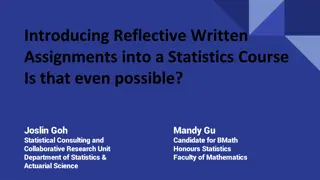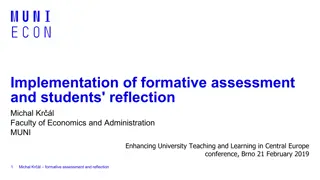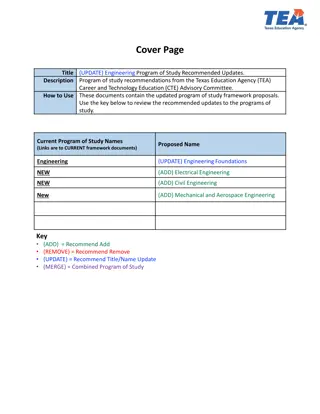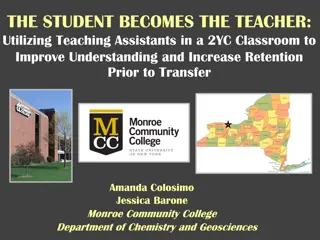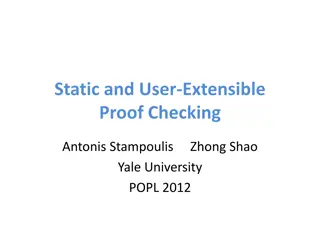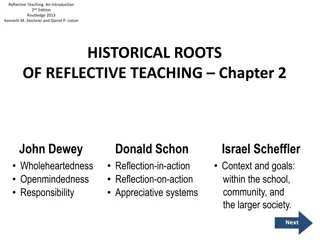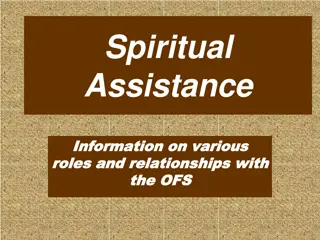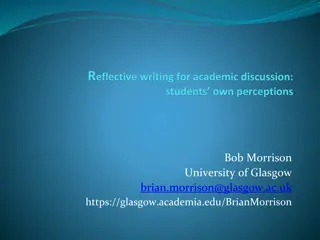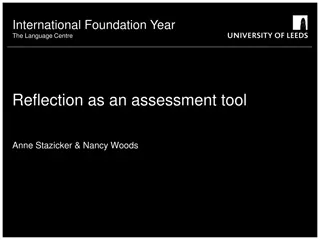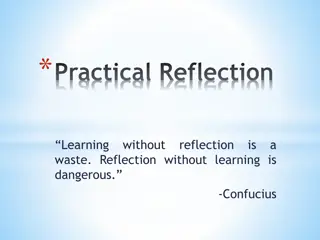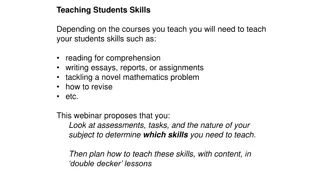Enhancing Reflective Writing in Engineering: A Guide for Students and Teaching Assistants
This course module series aims to improve reflective writing skills for engineering students, teaching assistants, and instructors. It covers the definition of reflection, its importance in learning and professional development, and practical strategies for effective written reflection. The content emphasizes intentional reflection to deepen educational experiences and enhance critical thinking skills. Written reflection is highlighted as a tool for developing employability skills and fostering holistic learning. The inquiry on the environmental impact of vegetarian protein sources versus beef showcases the application of reflective practices in real-world scenarios.
Download Presentation

Please find below an Image/Link to download the presentation.
The content on the website is provided AS IS for your information and personal use only. It may not be sold, licensed, or shared on other websites without obtaining consent from the author. Download presentation by click this link. If you encounter any issues during the download, it is possible that the publisher has removed the file from their server.
E N D
Presentation Transcript
1 COURSE CODE Virtual Learning Strategy COURSE NAME Reflection in Engineering Assessing Reflective Writing for Teaching Assistants Prepared by Kyle Ansilio (ansilikf@mcmaster.ca) Updated: September 30 2021
2 Reflection in Engineering This series of modules is intended to enhance the practice of reflective writing of all engineering students by providing meaningful content for students, teaching assistants, and instructors. This chapter will provide students with fundamental knowledge and strategies needed in order to effectively engage in written reflection
3 Video 1 What is reflection?
4 Reflection Reflection is the conscious examination of past experiences in order to identify new knowledge. Through active consideration and evaluation of learning and professional practices, students uncover the meaning of the experience and thereby construct new knowledge. The goal of reflective practice is to inform present and future projects through decisions, actions, attitudes, and the understanding of oneself. We do not learn from experience... we learn from reflecting on experience. (Dewey 1966)
5 Everyday Reflection Reflection occurs all the time and all throughout our lives. When you avoid eating a certain food because you remember getting sick the last time you ate it, that is a form of reflection. When you use an oven mitt because you remember burning your hand on a hot pan, that is a form of reflection. When you study a specific topic a little bit more because you didn t do so well on that part of the test, that is a form of reflection. Reflection can occur instinctually, reflexively, or intentionally. This module focuses on intentional reflection, which helps us learn even more from our educational experiences.
6 Written Reflection Reflection can occur through thinking, conversation, or writing. For our purposes, we will focus on written reflection. Written reflection develops important employability skills like problem-solving, higher order reasoning, integrative thinking, goal clarification, openness to new ideas, ability to adopt new perspectives and systemic thinking (Ash & Clayton 2009).
My inquiry sets out to answer, Why simulated meat products and other vegetarian protein sources are less resource-intensive than beef (as a protein source) in North America? . Evident in what I just said, I have a bias to believe that the vegetarian protein options are better for the environment. I admit, I stopped consuming red meat on a regular basis for both environmental and health reasons, so getting over this bias to make a fair comparison was a challenge in this inquiry. Student Quotes (to be featured on pressbook page) -Engineering and Society graduate
Through failure, I appreciated the interdisciplinary collaboration in research. I realized that seeking help does not reflect my weakness; rather, it represents strengths in recognizing my limitations and complementing different skillsets. Student Quotes -Health Sciences graduate
By working with a solid financial plan, I found that my original ideas were also becoming more robust in their execution, and that I was better able to prepare my development strategies and solve more complex problems in unique and novel ways. Student Quotes -Engineering and Society graduate
10 Frameworks There are many frameworks that can be used to facilitate written reflection. These frameworks either build upon or adapt a fundamental reflective process: what? So what? Now what? (Rolfe et al. 2001). This framework is used to evaluate experiences to identify areas of improvement.
11 What? The first fundamental component of reflection is a summary of the experience that sets the context for reflection on specific knowledge and skills. Ask yourself questions like: When did this experience take place? Where did it take place? What actions did you take? How did you feel during these experiences?
12 So what? The second fundamental component of reflection discusses what was learned from this event that was surprising, highlighted prior misconceptions, or improved understanding of applied knowledge. Ask yourself questions like: What new knowledge or skills did you gain? What previous knowledge did you apply? Did it go well? Why or why not? What might you have done differently?
13 Now what? The third fundamental component of reflection explores the future and actions taken that will be a consequence of the experience. Ask yourself questions like: What goals might you have after going through this experience? What will you do in similar situations in the future?
14 Non-Reflection It s important to differentiate between what is reflective writing, and what is not reflective writing. Let s look at a brief example of written work that is NOT a reflection: I studied for 3 hours the night before the test, but I failed it and felt really guilty afterwards. This example provides us with some context and a summary, but it doesn t tell us much about why this experience was important or what the student will change in the future.
15 Non-Reflection Let s explore a more reflective version of this same passage. I studied for 3 hours the night before the test, but since I failed it, I know that my understanding of the material was poor and that I didn t spend enough time reviewing it. Before the next test, I will review the practice problems ahead of time to identify any topics I am struggling with. In this submission, the student has recounted the experience, unpacked what the experience meant to them, and identified a strategy to use in the future. This reflects all three components of the what? so what? now what? model.
16 Section 1 Wrap Up Practice of this fundamental model is critical to successful and effective reflection. One of the most common mistakes made when writing reflections is to stop at the what? step. Remember, a reflection is more than a lab report or a retelling of events. By digging deeper into how our understanding has changed following an event, we can extract even greater learning from our experiences. (Students do an H5P activity after this should it be referenced directly in the video?)
17 Activity https://kyleansilio.h5p.com/content/1291415290863727638
18 Video 2 Writing Reflections
19 Activity After reviewing an example of written reflection, participants will be asked to write a written reflection of their own using a set of prompts. Should this be done in the video? Or should it be done on the Pressbooks page following section 1?
20 Writing Reflections It s time for you to practice writing a reflection, but before you begin, it may be helpful to see an example using the What? So what? Now what? framework. This example looks at a student experience in a Nuclear Engineering laboratory course, where the student was asked to compare theory with empirical observations. For your benefit, this example will explicitly be broken into the three components of the fundamental refection model.
21 Example Reflection (pt. 1) In the fourth year of my undergraduate program, I participated in a laboratory activity in which we were to compare the theoretical levels of Xenon in the McMaster Nuclear Reactor (MNR) with the actual data logs recorded by the reactor operators. This lab report was done individually. One aspect that made me nervous was that I was not comparing theoretical Xenon level directly to recorded Xenon level, but rather I had to calculate the measured Xenon levels based on the activities recorded by the operators. I was nervous that I would not be able to interpret the operator s notes correctly, which would then make it very hard to compare to a theoretical model.
22 Example Reflection (pt. 2) Initially after converting the operator records, I found that the data was not fitting the theoretical levels whatsoever. I was really discouraged by this, so I referred to the course readings to see where I might have missed vital information. After looking back, I had realized that I missed two important, yet subtle, steps in converting the data. I had not accounted for the fact that the polarity of the two measurements were reversed, and so I needed to flip one of the graphs. I also missed an offset, meaning I had to shift one of the graphs down. After making these corrections, the data was a perfect fit! Seeing the two graphs line up was very fulfilling, and it was the result of applying knowledge that I had learned while also identifying knowledge that I had misunderstood or missed entirely the first time.
23 Example Reflection (pt. 3) This lab was important to Nuclear Engineering because Xenon levels are what dictates whether a reactor can be powered on or not. By going through this lab, I am now aware how, as a reactor operator, I would be able to judge the status of reactor based on these readings. Having recognized the calculations that I did not do properly the first time, I feel much more confident about never forgetting those steps again.
24 Video 2 Wrap Up Now it s your turn! Try to think of an important educational experience that you ve had. What was it? Why was it important? What did you learn from it? Be sure to sure to address each point of the What? So what? Now what? model. Good luck!
25 Video 3 Evaluating Written Reflection
26 Evaluation This video provides fundamental knowledge and resources needed in order to effectively assess written reflections that are submitted by students.
27 Evaluation It is important to recognize that reflection can be a very personal and vulnerable experience for students. Please be patient and constructive when working with students that are early in exercising reflective thinking. The ability to reflect upon an experience to discover what was learned is often a new skill that must be developed and scaffolded. Students need substantial feedback and scaffolding to be successful when they are new to this kind of expression. Share with students that you are not looking for the right answer here but, rather, for what the learning means to them. Through timely feedback, we can address student misconceptions about both the reflection assignment and their analysis of the experience and let students know when they are on the right track.
28 Basic Rubric Brock University uses a rubric with specific criteria to assess reflection, including reflection on prior knowledge, connecting experience to academic concepts, and evidence of development or growth as an individual. It is relatively straightforward and effective for even novice reflections. https://brocku.ca/pedagogical-innovation/resources/experiential-education/role-of- reflection/#1540495276176-eee449b6-832e
29 Advanced Rubric The University of Edinburgh uses a rubric with more criteria that explore personal growth. In addition to the criteria in the Brock rubric, this resource evaluates students emotions and their description of a disorienting dilemma, a situation where their experience conflicts with their prior understanding. https://www.ed.ac.uk/reflection/facilitators-toolkit/assessment/rubrics
30 Activity Before practicing yourself, let s go through an example of evaluating written reflection using Brock s Basic Rubric. The following example is a written reflection that focuses on an Engineering design report. Students will then be asked to evaluate their own written reflection using the Brock rubric.
31 Example Firstly, the most obvious thing that I discovered was the advantage of working as part of a group. I learned that good teamwork is the key to success in design activities when time and resources are limited. As everyone had their own point of view, many different ideas could be produced, and I found the energy of group participation made me feel more energetic about contributing something.
32 Example Secondly, I discovered that the choice of materials was not as important as the design when it comes to making standing structures. With the Impromptu Design activities, we used some simple materials such as straws, string, and balloons, but were still able to apply our understanding of stress and strain in order to build structures to specified constraints. I learned that every design has its weaknesses and strengths and working with a group can help discover what they are. In future designs, I will ensure that every member of my team is heard, and that stress and strain analyses of our designs are done as early as possible.
33 Existing Knowledge Let s first look at the first category in the rubric; reflecting on existing knowledge. This reflection explicitly mentions that each member had their own pre-existing knowledge and ideas, but does not dive deeper into what these pieces of knowledge or ideas were. For this reason, this reflection would score in the Habitual Action/Non-Reflection Category .
34 Academic Concepts Next, we ll look at the second category; connection to academic concepts. This reflection explicitly mentions that the author applied their understanding of the academic concepts: stress and strain. The author was able to conclude that following these principles would make even the strangest choice of materials viable. For this reason, this reflection would score in the Critical Reflection Category .
35 Evidence of Development Finally, we ll look at the third category; evidence of development. This reflection explicitly identifies a strategy that the author will employ during similar experiences in the future, but does not quite elaborate on how this strategy differs from how they would have proceeded prior to this report. For this reason, this reflection would score in the Reflection Category .
36 Video 3 Wrap Up Now it s your turn! Remember to exercise patience and understanding with reflection novices to help them build confidence in their abilities to reflect and construct new meaning. Good luck!



